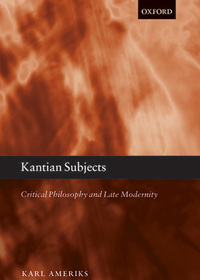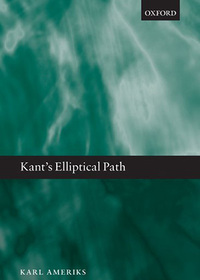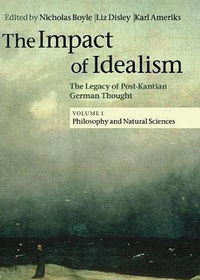
- University of Notre Dame
- McMahon-Hank Professor of Philosophy
- Residential Fellow (2010-2011)
- "Kant’s Elliptical Path: On the Stages, Limits, and Aftermath of Critical Philosophy"
Karl Ameriks is the McMahon-Hank Professor of Philosophy at the University of Notre Dame and specializes in the history of modern philosophy, continental philosophy, and modern German philosophy. Much of his research is dedicated to the study of Immanuel Kant about whom he has published multiple books.
His most recent monographs include Kant's Theory of Mind: An Analysis of the Paralogisms of Pure Reason (2000), and Kant and the Fate of Autonomy: Problems in the Appropriation of the Critical Philosophy (2000),Interpreting Kant’s Critiques (2003), Kant and the Historical Turn: Philosophy as Critical Interpretation (2006), and more than 100 articles and scholarly writings. He is a founding co-editor of Internationales Jahrbuch des Deutschen Idealismus (International Yearbook of German Idealism) and since 1994 he has served as a co-editor of the approximately 70-volume series, Cambridge Texts in the History of Philosophy. He has served as a member of the Board of Directors for the Journal of the History of Philosophy and on the editorial boards of Owl of Minerva (Hegel Society of America), Critical Horizons, Kant Yearbook, Oxford Philosophical Concepts, and Philosophisches Jahrbuch.
A faculty fellow in Notre Dame’s Nanovic Institute for European Studies, Professor Ameriks was elected a fellow of the American Academy of Arts and Sciences (AAAS) in 2009. Among his many prestigious honors and awards are several fellowships from the National Endowment for the Humanities (NEH), the Earhart Foundation (most recently in 2010) and an Alexander von Humboldt Fellowship. He is a former member of the American Philosophical Association Board of Officers (2003-2005) and past President of the Central Division of the American Philosophical Association (2004-2005) and the North American Kant Society (1991-1994).
Publications
-
Kantian Subjects: Critical Philosophy and Late Modernity
Oxford University Press, 2020

In this volume, Karl Ameriks explores ‘Kantian subjects’ in three senses. In Part I, he first clarifies the most distinctive features-such as freedom and autonomy-of Kant’s notion of what it is for us to be a subject. Other chapters then consider related ‘subjects’ that are basic topics in other parts of Kant’s philosophy, such as his notions of necessity and history. Part II examines the ways in which many of us, as ‘late modern,’ have been highly influenced by Kant’s philosophy and its indirect effect on our self-conception through successive generations of post-Kantians, such as Hegel and Schelling, and early Romantic writers such as Holderlin, Schlegel, and Novalis, thus making us ‘Kantian subjects’ in a new historical sense. By defending the fundamentals of Kant’s ethics in reaction to some of the latest scholarship in the opening chapters, Ameriks offers an extensive argument that Holderlin expresses a valuable philosophical position that is much closer to Kant than has generally been recognized. He also argues that it was necessary for Kant’s position to be supplemented by the new conception, introduced by the post-Kantians, of philosophy as fundamentally historical, and that this conception has had a growing influence on the most interesting strands of Anglophone as well as Continental philosophy.
-
Kant's Elliptical Path
Oxford University Press, 2012

Kant’s Elliptical Path explores the main stages and key concepts in the development of Kant’s Critical philosophy, from the early 1760s to the 1790s. Karl Ameriks provides a detailed and concise account of the main ways in which the later Critical works provide a plausible defence of the conception of humanity’s fundamental end that Kant turned to after reading Rousseau in the 1760s. Separate essays are devoted to each of the three Critiques, as well as to earlier notes and lectures and several of Kant’s later writings on history and religion. A final section devotes three chapters to post-Kantian developments in German Romanticism, accounts of tragedy up through Nietzsche, and contemporary philosophy. The theme of an elliptical path is shown to be relevant to these writers as well as to many aspects of Kant’s own life and work.
The topics of the book include fundamental issues in epistemology and metaphysics, with a new defense of the Amerik’s ‘moderate’ interpretation of transcendental idealism. Other essays evaluate Kant’s concept of will and reliance on a ‘fact of reason’ in his practical philosophy, as well as his critique of traditional theodicies, and the historical character of his defense of religion and the concepts of creation and hope within ‘the boundaries of mere reason’. Kant’s Elliptical Path will be of value to historians of modern philosophy and Kant scholars, while its treatment of several literary figures and issues in aesthetics, politics, history, and theology make it relevant to readers outside of philosophy.
-
The Impact of Idealism: The Legacy of Post-Kantian German Thought
Cambridge University Press, 2013

The first study of its kind, The Impact of Idealism assesses the impact of classical German philosophy on science, religion and culture. This volume explores German Idealism’s impact on philosophy and scientific thought. Fourteen essays, by leading authorities in their respective fields, each focus on the legacy of a particular idea that emerged around 1800, when the underlying concepts of modern philosophy were being formed, challenged and criticised, leaving a legacy that extends to all physical areas and all topics in the philosophical world. From British Idealism to phenomenology, existentialism, pragmatism and French postmodernism, the story of German Idealism’s impact on philosophy is here interwoven with man’s scientific journey of self-discovery in the nineteenth and early twentieth centuries – from Darwin to Nietzsche to Freud and beyond. Spanning the analytical and Continental divide, this first volume examines Idealism’s impact on contemporary philosophical discussions.